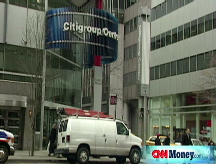Mortgage insurers face tough road
Companies like MGIC and PMI have been hit hard by the housing slowdown. Worries about Fannie Mae and Freddie Mac won't help either.
NEW YORK (CNNMoney.com) -- As the market debates the underlying health of Freddie Mac and Fannie Mae, another important corner of the housing market is getting squeezed.
Mortgage insurers, which help many consumers afford homes, have been hit particularly hard in recent weeks as the housing market continues to deteriorate further and as signs of trouble mount for the broader U.S. economy.
Since the start of June, nervous investors have sent shares of three of the largest insurers MGIC Investment Corp. (MTG), PMI Group Inc. (PMI) and Radian Group Inc. (RDN), down 52%, 73% and 76% respectively.
At the same time, credit rating agencies have downgraded several mortgage insurers in recent weeks including MGIC and Republic Mortgage Insurance Company, a division of Old Republic International Corp. (ORI), amid fears that rising mortgage delinquencies and defaults will mean more losses in the future for these insurers.
Radian, MGIC and PMI have all posted losses in the past three quarters and right now analysts expect the trio to finish the year in the red.
Since emerging in the late 1950s, the state-regulated mortgage insurance industry has become an ingrained part of the housing market by allowing Americans to buy a home with less money down. Borrowers who cannot afford the traditional 20% down payment are required by their lender to take out mortgage insurance just in case a borrower defaults on their payments.
In turn, the lender can then sell that same mortgage to Freddie Mac or Fannie Mae, the government sponsored enterprises that buy pools of mortgages.
But with homeowner defaults rising, mortgage insurers have now found themselves overwhelmed by claims.
In May, defaults on privately-insured mortgages jumped 48% from a year ago, according to data published last week by the industry group Mortgage Insurance Companies of America.
"When you have a housing market which continues to fall and jobs going away that is just creating more headwinds for [these] companies to get through this period," said Michael Grasher, an analyst at Piper Jaffray, who covers the mortgage insurance industry.
While companies like MGIC have attempted to prepare for such a scenario by raising capital, mortgage insurers as a group have also tried to avert further losses by tightening their lending standards and ultimately shrinking the number of loans they insure.
Analysts at the research firm CreditSights warned recently that some firms could stop writing new business altogether, following in the footsteps of Triad Guaranty Inc. (TGIC) In June, Triad said it will only service existing policies.
In many ways, the fate of the mortgage insurers is tied to Freddie Mac (FRE, Fortune 500) and Fannie Mae (FNM, Fortune 500). If either GSE deems that a company is no longer an approved mortgage insurer, as Freddie did with Triad, the industry could face even bigger trouble ahead.
But mortgage insurer woes could also signal more problems for both Freddie and Fannie. While the duo has the implied backing of the federal government, they also bought many of the same toxic loans that the mortgage insurers are now grappling with, suggesting that their loan portfolios are in even worse shape than many believe.
At the same time, Fannie and Freddie need mortgage insurers. The housing slowdown has already hit the portfolios of Fannie and Freddie. But if more mortgage insurers stop backing new loans, that could mean fewer loans for Freddie or Fannie to purchase and profit from. ![]()



